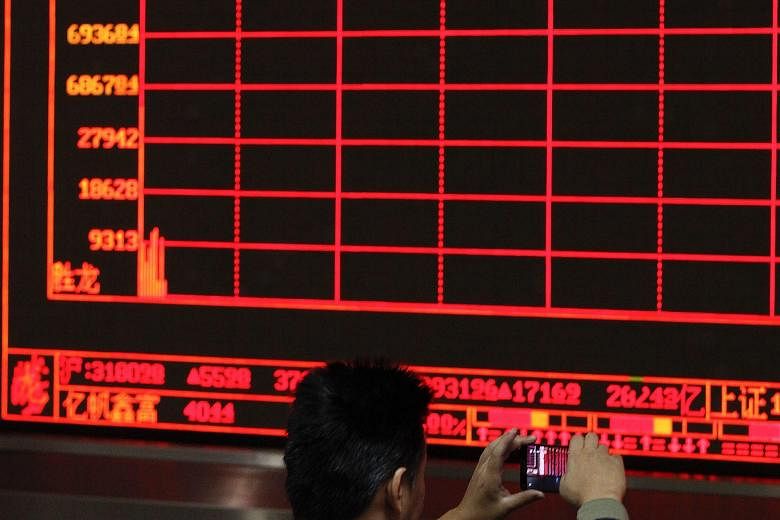A policy shift by Chinese regulators late on Thursday night helped cool down China's stock markets yesterday, although it took a while.
It also allowed the rest of the region to catch its breath after a four-day rout.
The fiery passions ruling the Chinese market were evident from the opening bell, when both the benchmark Shanghai Composite Index and the Shenzhen Composite Index shot up more than 2 per cent within seconds.
The exuberance was stoked by news that the Chinese authorities had decided to remove a new circuit-breaker mechanism which they admitted had done more harm than good.
But within minutes, the market gains swung wildly into reverse, leaving both bourses 2 per cent in the red.
The market eventually found its footing, leading to a 2 per cent gain at the close for Shanghai, but a 10 per cent loss for the week as a whole.
Shenzhen ended the day 1 per cent higher, but has slumped more than 14 per cent for the week.
Many market observers blame the week's volatility on the circuit breakers, introduced on Monday to encourage more orderly trading - but which did the reverse.
When the circuit breakers - which are designed to halt trading when shares fall too sharply - kicked in on Monday and Thursday, they caused panicked investors to line up to sell off their stocks as soon as trading resumed, worsening the volatility, critics said.
As Shanghai markets rallied yesterday, the relief among investors across Asia was palpable, with several regional bourses chalking up gains.
The local benchmark Straits Times Index added 21.32 points, or 0.78 per cent, to finish at 2,751.21 yesterday - but still 4.6 per cent down for the week.
Hong Kong climbed 0.6 per cent, but declined 6.7 per cent overall this week, while Seoul ended the day 0.7 per cent higher, paring its decline for the week to 2.2 per cent.
Tokyo fell 0.4 per cent, marking a 7 per cent drop for the week. For Asian stocks, it was the nastiest week since 2011.
But yesterday's breather helped lift regional currencies, which had also been sliding over the previous four days.
This too was led by China. The yuan, which has been declining steadily over the past week, strengthened in early trading, with dealers suspecting that the Chinese central bank had intervened to prop up the currency.
The move helped to lift the Indonesian rupiah, South Korean won, Indian rupee, Malaysian ringgit and Australian dollar against the United States dollar.
The Singapore dollar, however, continued to soften against the greenback, weakening to $1.4376.
Remisier Desmond Leong said yesterday's stock market gains will likely be short-lived.
"If you look at the STI chart, it moved up from the market's opening until close to noon, then it drifted down and went sideways, so it is more of a technical rebound," he said.
"There were clients who called me looking for bargains, but I told them to wait. You would be catching a falling knife if you enter the market now."
Indeed, the policy reversals and meddling are a sign that the Chinese government is still unused to letting go in a free market, said Bank of Singapore chief economist Richard Jerram.
"If policy towards equities and (the yuan) seems confused, it is probably because the policymakers themselves are confused. This is not too surprising," he wrote in a note to investors yesterday.
"The policy elite has grown up through decades of statist controls, so we cannot expect it to adapt rapidly to the vagaries of free markets.
"The broader implication is that the road to allowing a dominant role for market forces in allocating resources will be a long and bumpy one."

